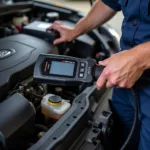Finding the right computer for diagnostic car use can be overwhelming. With so many options available, it’s important to understand what to look for and how these tools can benefit you. This comprehensive guide will walk you through everything you need to know about car diagnostic computers, from choosing the right one to maximizing its use.
Why Use a Computer for Car Diagnostics?
Modern vehicles are complex machines with intricate electronic systems. A computer for car diagnostics, often referred to as an OBD2 scanner, serves as a window into these systems. It allows you to:
- Read and understand Diagnostic Trouble Codes (DTCs): When your car’s check engine light turns on, it means there’s a problem. An OBD2 scanner reads these codes, providing insight into the issue.
- Monitor live data streams: Observe real-time data from various sensors, such as engine speed, coolant temperature, and oxygen sensor readings. This information helps identify potential problems before they escalate.
- Perform specific tests: Depending on the scanner’s capabilities, you can conduct component activations, such as turning on the fuel pump or cycling the EVAP system for testing.
Types of Car Diagnostic Computers
Car diagnostic computers come in various forms, each offering different levels of functionality and price points:
1. Basic Code Readers:
- Affordable and easy to use: Ideal for casual users who want to read and clear basic DTCs.
- Limited functionality: Typically, they only display the code without providing detailed descriptions or live data.
2. Handheld Scanners with Screens:
- More features than basic code readers: Offer additional information, such as code definitions, live data, and graphing capabilities.
- Mid-range price point: Provide a good balance between cost and functionality for most DIYers.
3. Professional-Grade Diagnostic Tools:
- Comprehensive functionality: Offer advanced features like bi-directional control, programming, and coding capabilities.
- Higher price tag: Designed for professional mechanics and experienced users requiring in-depth diagnostics.
Factors to Consider When Choosing a Diagnostic Computer
Selecting the right computer for your needs involves considering several factors:
- Your Skill Level: Are you a casual user, DIY enthusiast, or professional mechanic?
- Vehicle Compatibility: Ensure the scanner supports your car’s make, model, and year.
- Features and Functionality: Determine the features you need, such as live data, graphing, and bi-directional control.
- Budget: Set a realistic budget based on your requirements and the available options.
Tips for Using a Car Diagnostic Computer
- Consult your vehicle’s service manual: Familiarize yourself with the specific codes and procedures for your car.
- Start with a clear understanding of the problem: Note down any symptoms or warning lights before connecting the scanner.
- Interpret the codes carefully: Use reliable sources to decipher the meaning of the codes and identify the underlying issue.
- Don’t rush into repairs: Thoroughly research the problem and consider seeking professional help if needed.
Conclusion
Investing in a computer for diagnostic car use empowers you to take control of your vehicle’s health. By understanding the different types of scanners, their features, and how to use them effectively, you can diagnose problems early on, save on costly repairs, and ensure your car runs smoothly for years to come.
FAQs
1. Can I use any car diagnostic computer on any car?
No, not all scanners are universally compatible. Ensure the scanner supports your car’s make, model, and year before purchasing.
2. Will a car diagnostic computer tell me exactly what’s wrong with my car?
While it provides valuable information about potential issues, it’s not always a definitive diagnosis. Further inspection and testing may be necessary.
3. Can I use a car diagnostic computer to reset my check engine light?
Yes, most scanners allow you to clear DTCs and reset the check engine light. However, it’s crucial to address the underlying problem before doing so.
4. Do I need a professional-grade scanner if I’m a DIY enthusiast?
Not necessarily. Handheld scanners with screens offer a good balance of functionality and affordability for most DIYers.
5. What are some reputable brands of car diagnostic computers?
Some well-regarded brands include car diagnostic computer manufacturers.
6. Where can I find affordable car diagnostic computers for sale?
Check out online retailers, automotive stores, and consider looking for used options.
7. What is a car computer diagnostic test?
It involves connecting a specialized scanner to your car’s OBD-II port to retrieve and interpret diagnostic trouble codes.
For further assistance, contact us via WhatsApp: +1(641)206-8880, Email: [email protected]. Our 24/7 customer support team is here to help.
